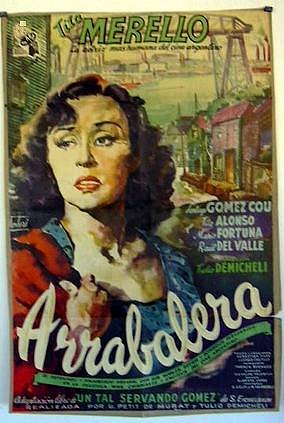 "I’m the pride of the whole barrio; my hope is my religion; because I’m a creole, a milonguera, I love my man sincerely."
"I’m the pride of the whole barrio; my hope is my religion; because I’m a creole, a milonguera, I love my man sincerely."
There's something really special about this song, composed in 1927. It was recorded twice by male singers (Carlos Gardel (!), Oscar Larocca) and both times it fell flat, in my opinion (although its composer, Osvaldo Fresedo, recorded a very fine instrumental version, and Juan "Pacho" Maglio gave it his special sauce). The problem is that those male singers had to sing the lyric in the third person: the lyric was a man telling about a woman, telling about her man: boring!
The song began to smolder in 1950, when songstress Nina Miranda and bandleader Graciano Gomez transposed it to the first person–finally, finally–letting the song's high-spirited narrator speak in her own voice. Next, it burst into open flame, or rather exploded, when Diana Durán got hold of it in '52, recording it with Enrique Mora's Quartet. The combination of first-person narration, Mora's punchy arrangement, and Durán's ebullient, tone-perfect delivery brings the song to life once and forever. And it only took twenty-five years!
Tango Decoder is indebted to DJ Xenia Mikhailov of Tel Aviv for bringing Arrabalero to our attention. Please be sure to follow her at "Tango DJ Xenia" on Facebook. She's always got something special on tap! Xenia's video below groups Arrabalero with three other Durán/Mora gems, Tango Argentino, Maula, and Gloria to make a really cool tanda. (Here's Tango Decoder's version of Maula, too!)
Thank you, DJ Xenia! This version's for you.
Arrabalero
Tango, 1927
Música: Osvaldo Fresedo
Letra: Eduardo Calvo
Lyrics as sung by Diana Durán with el Cuarteto Enrique Mora
On YouTube:
Diana Durán with Enrique Mora Quartet (1952, begins at 2:18)
Nina Miranda with Graciano Gomez (1950)
| Soy la pebeta más rechiflada
que en el suburbio pasó la vida; soy la percanta que fue querida de aquel malevo que la amuró. Soy el orgullo del barrio entero, tengo una efe que es mi ilusión, pues soy criolla, soy milonguera, quiero a mi hombre de corazón. En un bulín mistongo
Por ser derecha tengo un machito
|
I’m the craziest chick* that ever spent a life in this slum; I’m the broad who was the lover of that thief who stole her heart. I’m the pride of the whole barrio, my hope is my religion, because I’m criolla, I'm a milonguera,* I love my man with all my heart. In a wretched little room I'll tell you straight, I've got a sweet |
* craziest chick: La pebeta mas rechiflada. Pebeta is Lunfardo slang for "girl, gal, chick, babe." In Lunfardo the adjective rechiflada has a wide range of meanings including "crazy," "mad," "disturbed," "perturbed," or "angry." But the verb rechiflar also means "to whistle loudly," in which case it could mean "whistled at." Which interpretation is correct? It's hard to say. There's something to be said for "whistled at," since by this assertion our proud arrabalera is bragging about her high standing in the arrabal; "crazy, mad" is implied, too, but don't tell our heroine. The sheet music for Anselmo Aieta's 1927 instrumental tango La chiflada depicts a beautiful though apparently somewhat deranged young lady; a male passerby is seen in the act of whistling at her. However, contemporary porteños (at least the ones of my acquaintance) read the word rechiflada as "crazy." So I went with that.
* criolla, milonguera: Criolla/o (Eng.: creole), a European-descended native of Latin America, especially one of pure Spanish descent. Milonguera, a female patron of milongas, a tango dancer.
* will cry tears of blood: llorará sangre. Gardel and Larocca both sang the lukewarm llorará siempre ("will cry forever"). The far more passionate llorará sangre, "will cry tears of blood," seems to have been Nina Miranda's innovation, and Durán sings it that way, too. Another reading of the line is "will cry blood," an even more potent expression. Strong stuff!
